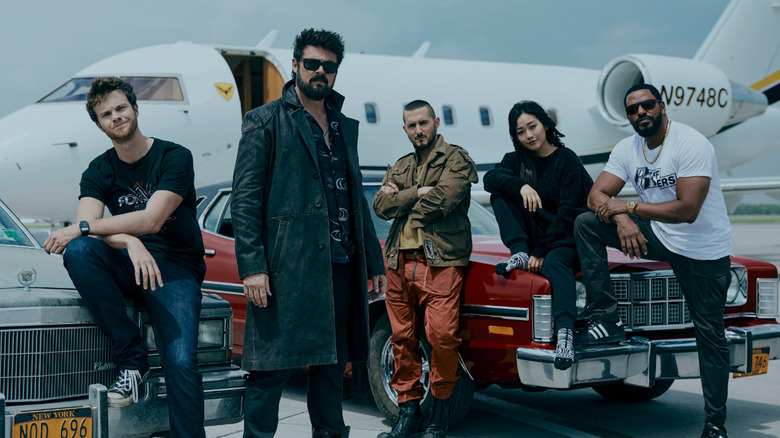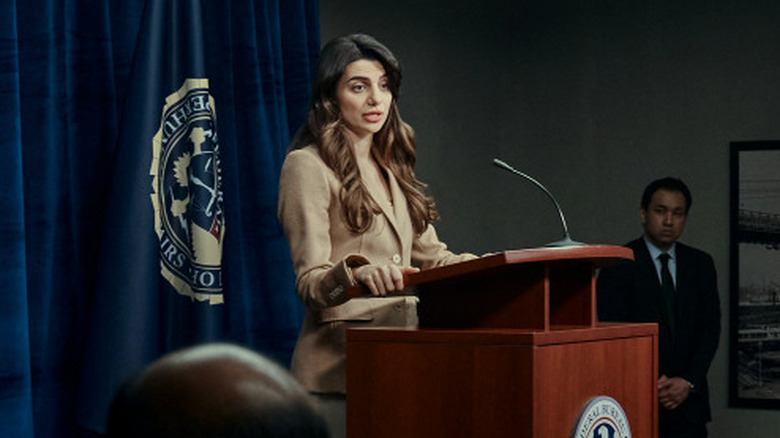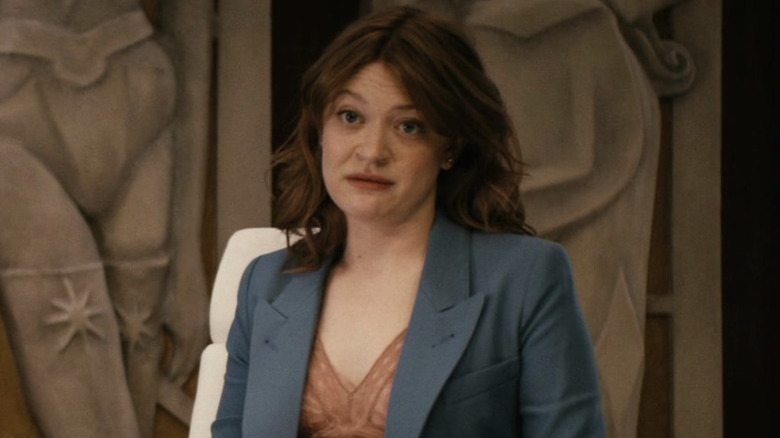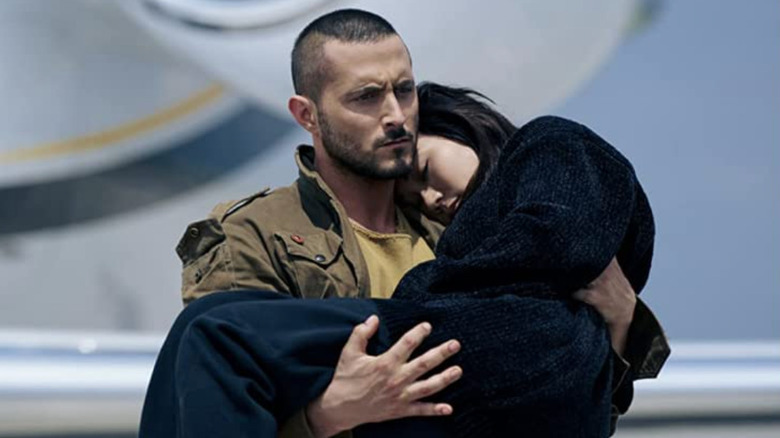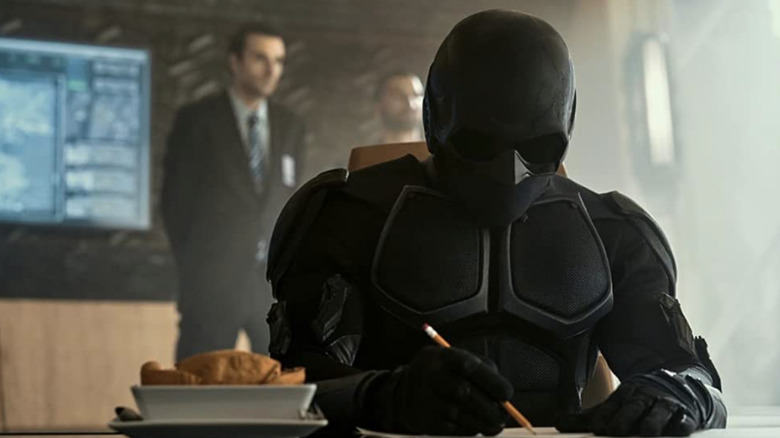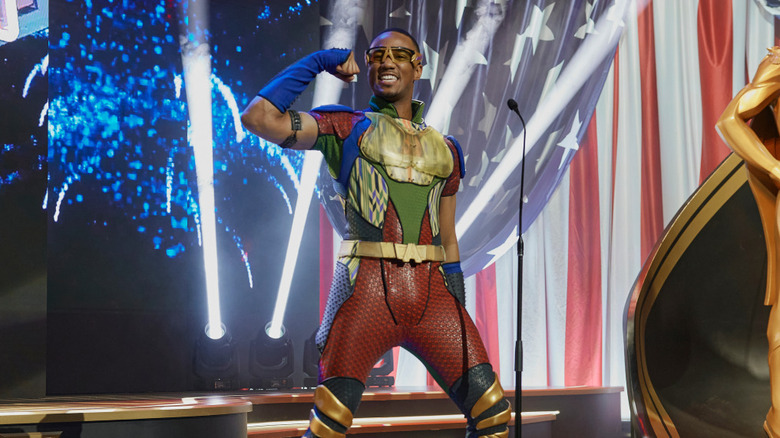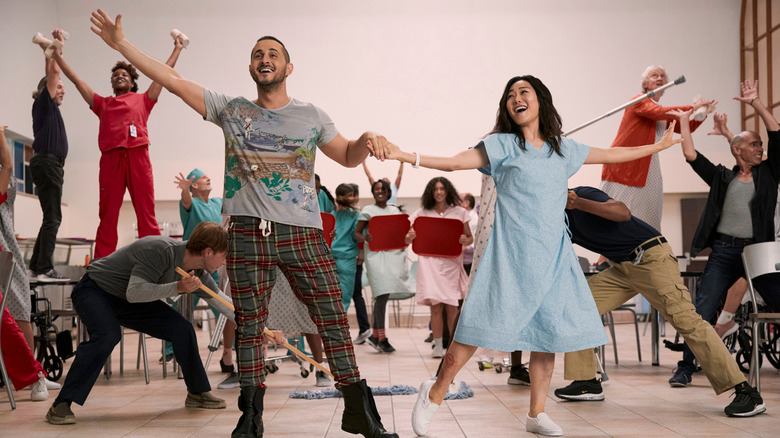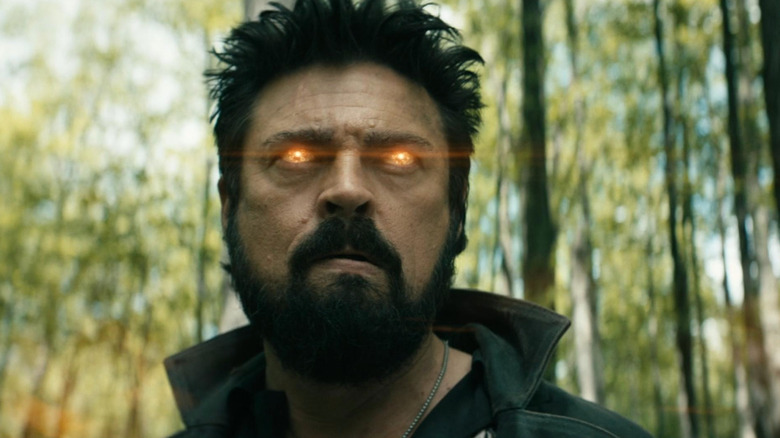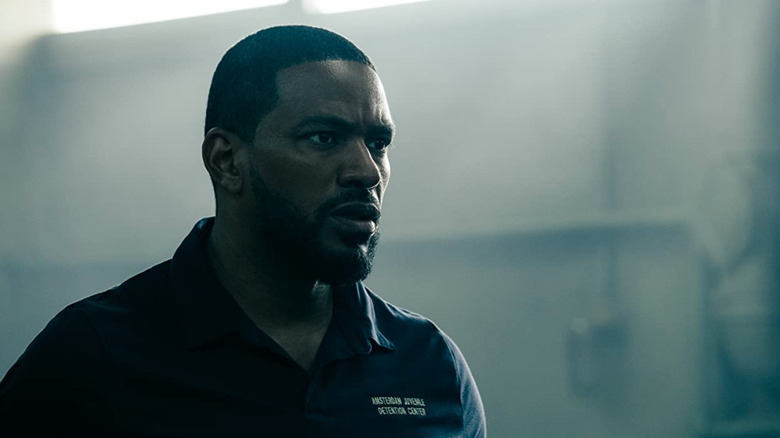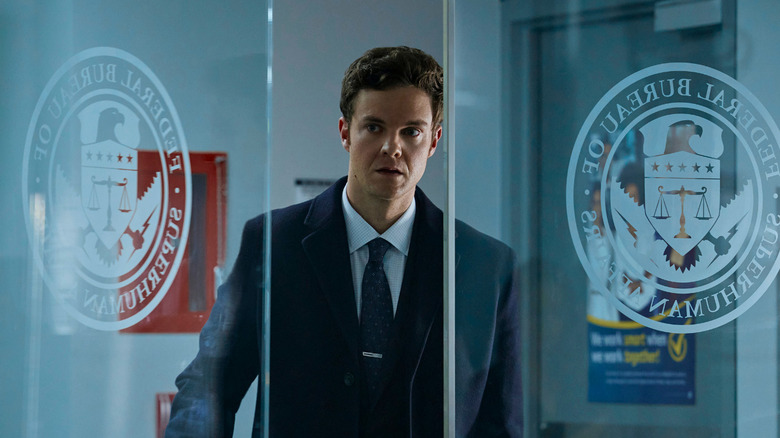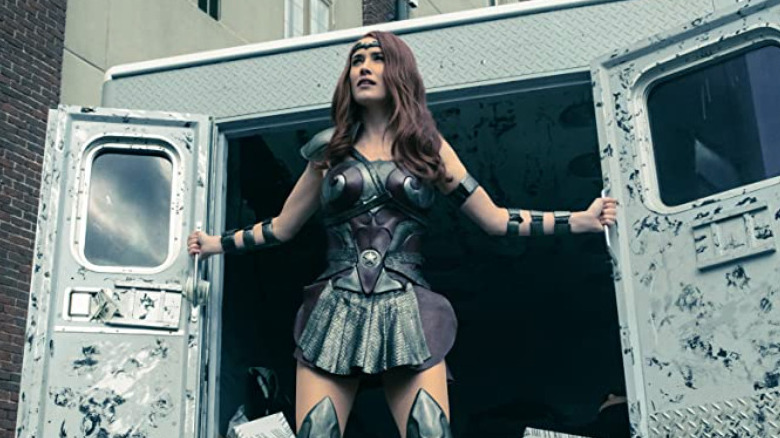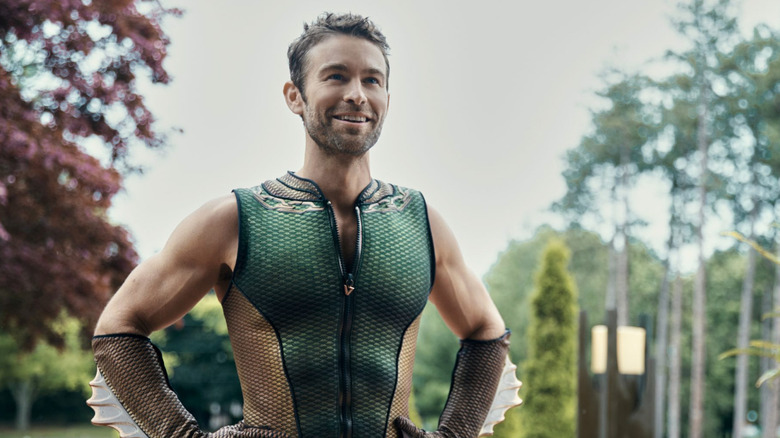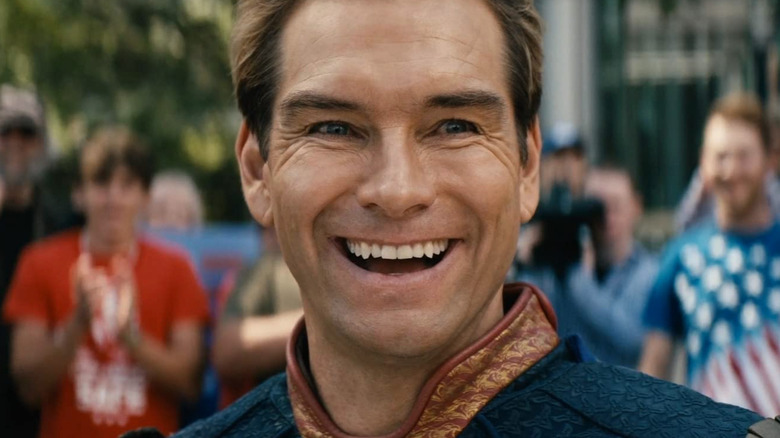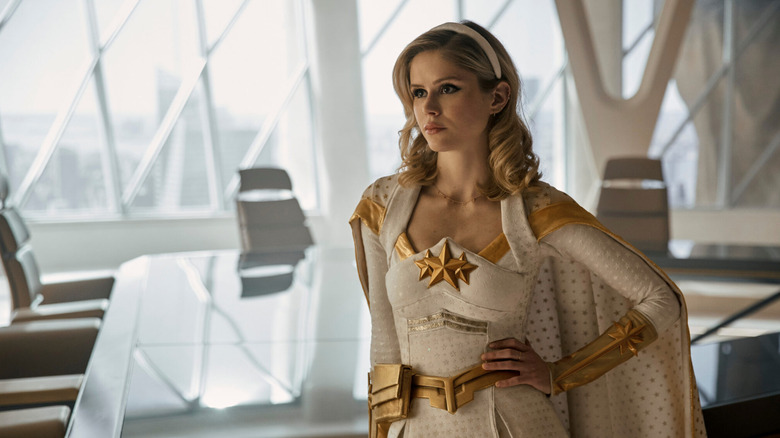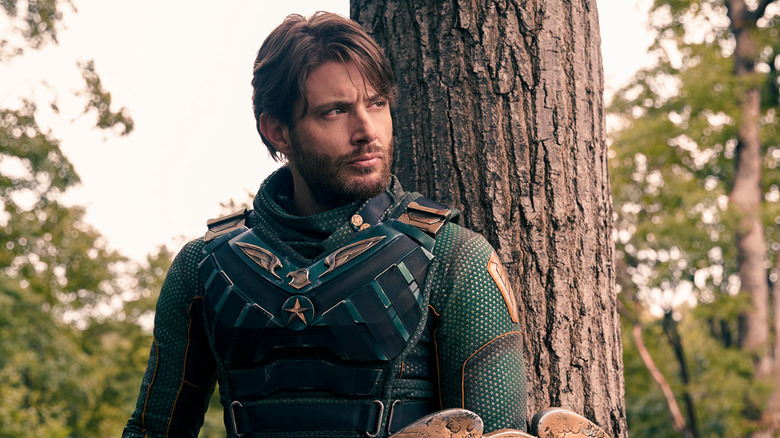Every Main Character In The Boys Season 3 Ranked Worst To Best
The following contains major spoilers for "The Boys" Season 3.
Season 3 of Amazon's "The Boys" hit the streaming platform with all the force of a runaway A-Train. Premiering to excellent reviews and a near-perfect score on Rotten Tomatoes, the third season of the show — already known for its outrageous and often hilarious content — treats viewers to infamous sex scenes, musical numbers, and jaw-dropping celebrity cameos. And that's not to mention the long-awaited "Herogasm" episode which must be seen to be believed. Showrunner Eric Kripke is having a blast with the seemingly non-existent limits on language and content, but he and the show's writers deftly walk the line between satire and gratuitousness, making sure to always keep the plot in mind when writing some of the show's gnarlier scenes.
"The Boys" has always had a deep bench of incredible characters, and Season 3 upped the ante with a few new additions, animated friends, and a very seductive octopus. This season also sees Kripke reunite with "Supernatural" star Jensen Ackles in a pitch-perfect send-up of Marvel's Captain America. Homelander's hold on the culture seems to be slipping and there's no doubt he's got steep competition for America's favorite superhero. The boundary-pushing show is firing on all cylinders and there really are no dull characters to be found. With the bar set extremely high, the following is a list of each main character from Season 3 ranked from worst to best.
14. Victoria Neuman
After providing that memorable stinger at the end of Season 2, Victoria Neuman enters Season 3 as an intriguing agent of chaos. The seemingly earnest politician first appears leading a rally to hold Homelander accountable for his heinous actions, but she is ultimately revealed to be the Supe behind the exploding heads at the U.S. House Judiciary Committee hearing in Season 2. Now heading the Federal Bureau of Superhuman Affairs, she continues to keep her own powers a secret. A visit from a childhood friend causes her to literally blow up her spot, however, and it seems her secret identity will soon become public knowledge.
Claudia Doumit was shocked to find out that her character has these abilities: "I didn't know until I got the script. It was definitely a 'what the f–k?' moment..." On any other show, Victoria's arc would be a season highlight. Turning on her old mentor, Vought CEO Stan Edgar, she is the catalyst for much of the show's forward progress. However, she gets lost in a season full of spectacular moments. Information about her past in a group home and tender moments with her daughter earn the Supe in disguise empathy from the audience that is later lost when she threatens Starlight and makes a murderous deal with Homelander. She ends the season in an even more powerful position and will likely have a more concise storyline down the road. For now, she remains frustratingly hard to pin down and occasionally forgettable.
13. Ashley Barrett
Promoted to CEO in the third season, Ashley Barrett finds that she has power in name only and is potentially in even more danger than before. The terrified executive has spent the past two seasons running herself ragged covering for her unruly Supes, but this is the first time we truly see how detrimental to her health the job actually is. Compulsively pulling her hair out to soothe her frazzled nerves, Ashley ends the season nearly bald, hiding her mangled scalp with a wig. Ashley doesn't do herself any favors, though, derailing A-Train's attempts to connect with his community with tone-deaf commercials and a whitewashed origin story film. She earns sympathy in the brief moment her mask slips and she reveals the extent of her terror to Starlight, but her fear of Homelander overrides her morality and she quickly shuts down the honest moment.
Ashley is a welcome source of comic relief (and tense scenes opposite Homelander) with her increasingly harried attempts to hold onto what little power she has, but she's often a wet blanket on intriguing plot developments and the gatekeeper for fundamental change at Vought. In an interview with Uproxx, actress Colby Minifie described the motivation driving Vought's perpetual clean-up woman: "I think Ashley is trying her best to do her job, and that can get in the way of actually doing what's right." Now completely cowed by Homelander, it's difficult to see Ashley changing much in Season 4. Minifie notes that Ashley "will do anything to save her ass," which may include revealing the sensitive information she gains in the final moments of Season 3. Only time will tell if she will ever find the courage to stand up to her maniacal boss.
12. Frenchie
The gentle Frenchman has long been the heart of Butcher's team, but Season 3 provides more insight into the former assassin's tragic past. Finally able to communicate with the woman he calls "mon coeur," he and Kimiko make exciting plans to relocate to his hometown, Marseille. Their trip is derailed by the return of Frenchie's psychopathic former boss Little Nina forcing him to choose between his criminal past and a happier future with Kimiko. Describing his character's relationship to TV Insider, actor Tomer Capone said, "He's standing in front of someone that is actually giving him a way out maybe or a different way to approach things." The two finally share a kiss this season though it remains to be seen if their relationship will ever become truly romantic.
Frenchie is responsible for finding and producing the only substance on Earth capable of killing Soldier Boy, but he feels largely absent from the season's main action. His reunion with Little Nina is underdeveloped and could be lifted out with little to no effect on the overall story. He is incredibly charming when singing and dancing to "I Got Rhythm," but the musical plot line revolves around Kimiko; he serves as the accessory to her character development. Frenchie unfortunately also misses his chance to fulfill a lifelong dream of seeing Herogasm and this absence seems to sum up his arc in Season 3. The show is simply filled to the brim with memorable characters and despite some sweet moments, Frenchie ultimately gets lost in the crowd.
11. Black Noir
The silent member of the Seven, Black Noir has always been somewhat of a mystery. But season 3 brings with it long-awaited character development with a heavy dose of heartbreak. The past two seasons have seen Noir dutifully carry out Homelander's dirty work, fall into a coma from a tree nut allergy, and little else. In fact actor Nathan Mitchell even told Digital Spy that he occasionally falls asleep in scenes, completely hidden beneath his monochromatic costume. But Noir finally removes the mask in an '80s-era flashback to his time in Nicaragua as a member of the pre-Seven Supe team Payback. He pleads with Stan Edgar for permission to reveal his personality to the world, but the Vought executive insists he keeps his face covered to appease racist consumers. This scene, not to mention the first time we actually hear Noir's voice, finally humanizes an underdeveloped character and single-handedly bumps him up a few spots on this list.
Noir finds support in an unlikely place, reuniting with imaginary friends from his childhood. Cartoon pizza mascot Buster Beaver and his animated animal friends give the solitary Supe some much needed love and encouragement, helping him process a moment of shocking abuse suffered at the hands of Soldier Boy. Showrunner Eric Kripke told TVLine that these imaginary friends have likely been with Noir all along providing moral support to the loneliest team member. Noir does not survive Season 3, but Mitchell will return in Season 4, recast as a different hero donning the same opaque suit. Maybe this new incarnation of the character will finally be allowed to let his personality shine through.
10. A-Train
A-Train has never been very likable, but the world's fastest man sees his most emotional growth this season. In a moment of clarity, he finally delivers a heartfelt apology to Hughie for Robin's death. Unfortunately, he counteracts this goodwill by turning on Supersonic and betraying Starlight's burgeoning plan to Homelander, trying to earn favor with his constant bully and the de facto leader of Vought. Finally back in the Seven after secretly orchestrating Stormfront's downfall, A-Train is eager to rebrand himself and get in touch with his cultural roots. But his tone-deaf attempts to do this include a dashiki-inspired new suit and a cringe-worthy parody of that infamous Pepsi commercial.
Demanding to confront lesser Supe Blue Hawk about his over-policing of Black neighborhoods, this arranged "apology" blows up in A-Train's face and leaves his brother badly injured. Actor Jessie T. Usher described his character's misguided actions to Digital Spy as "the perfect depiction of what happens when you have someone who is in a position who wants to use his voice for something positive. He wants to put out a message. And then it just gets screwed up." Usher plays the complicated character with such empathy that we want him to succeed even when doing detestable things. A-Train's arc is topical and his missteps are unfortunately common, making him both relatable and frustrating. His story often feels too close to home to hate, but too uncomfortable to root for.
9. Kimiko Miyashiro
Season 3 is a big one for Kimiko and sees the mute superhero finally able to use her metaphorical voice. Known in the comics as simply The Female, Kimiko has come a long way from the lonely girl imprisoned in a dirty basement cell. Season 3 allows her to begin making choices about her future and reconsider the hitman lifestyle she's fallen into. Finally able to communicate with her beloved Frenchie beyond gestures and body language, she imagines two different musical numbers, a large-scale song and dance routine with him and her own solo rendition of "Dream a Little Dream of Me."
Though Kimiko's arc runs the gamut of endearing absurdity, from dildo fights to dance numbers, her most important choice comes in the wake of an attack by Soldier Boy, freshly liberated from Russian cold storage. After shielding Frenchie from his blast, Kimiko notices she is not immediately healing from the massive wound on her side. The Boys rush her to the hospital where she realizes she has lost her superpowers. At first, Kimiko is overjoyed, but when Frenchie is almost killed by Little Nina, she realizes that her powers help her protect the people she loves. She convinces Annie to steal Compound V in order to restore her superhuman abilities and it's this decision that places her higher on the list than her Frenchman partner. Kimiko's choice to permanently become a Supe in order to protect him, her chosen family, is a powerful moment and provides an interesting counterpoint to other characters conflicted over their use of the powerful drug.
8. Billy Butcher
The perpetually tortured ringleader of The Boys, Billy Butcher sees his share of emotional turmoil this season. Still reeling from Becca's death, he follows through on his promise to look out for her son Ryan, only to find that his nemesis Homelander is able to give the boy the emotional support Butcher cannot. Committed to killing the cape-wearing psychopath, Butcher teams up with Maeve to find a Russian super weapon that killed Soldier Boy hoping it will also have the power to kill Homelander. But the weapon they seek turns out to be Soldier Boy himself, held prisoner by the Russians for decades now free to exact his own revenge.
Chipping away at his nearly impenetrable emotional walls, this season gives Butcher another heartbreaking backstory as an attack from Mindstorm leaves him trapped in a nightmarish memory from his past. Karl Urban sees the crux of Butcher's arc in his decision to take Temp V, a variation of Compound V that gives the user superpowers for a day but will eventually become fatal. Urban told Collider, "It's a choice of, are you willing to turn yourself into the thing that you despise the most, in order to defeat that?" Though it is fun to watch the grizzled antihero finally gain his own powers, this season signals a major transition for the character. With his death all but certain due to his overuse of Temp V, Butcher's Season 3 arc sets up a more dynamic story that will likely pay off down the road.
If you or anyone you know is having suicidal thoughts, please call the National Suicide Prevention Lifeline at 1-800-273-TALK (8255).
7. Mother's Milk
Mother's Milk has long been the moral compass of Butcher's team and Season 3 sees him again try to move his life in a positive direction by leaving the Boys behind. Though Monique has moved on with a new boyfriend, M.M. tries to be a good father to his daughter Janine, but finds his OCD creeping back into his daily life. He reluctantly joins Butcher in his quest for the Russian super weapon but feels intensely betrayed when his friend joins forces with Soldier Boy, the Supe responsible for the long-ago death of M.M.'s grandfather. Viewing Season 3 as his character's origin story, Laz Alonso told Haute Living, "It also shows that no matter how hard we fight to bury trauma and our past, the only way to truly overcome it is to accept it."
M.M. forms an endearing partnership with Starlight, one of the few characters who shares his dedication to morality, and sacrifices his decade-spanning desire for revenge in order to save the attendees of Herogasm. M.M.'s struggles to deal with his mental illness are inspiring and relatable as is a tear-jerker moment with his daughter in the season finale. After trying in vain to hide his feelings from Janine, M.M. finally sits down with his daughter and explains their family's painful past. Like Butcher, he is forced to confront his past in order to find his way into the future, but M.M.'s story ends in a more satisfying place of personal acceptance, leaving us with the hope that he has finally been able to put his inner demons to rest.
If you or someone you know needs help with mental health, please contact the Crisis Text Line by texting HOME to 741741, call the National Alliance on Mental Illness helpline at 1-800-950-NAMI (6264), or visit the National Institute of Mental Health website.
6. Hughie Campbell
Hughie begins Season 3 in an enviable position. Attempting to fight Vought "the right way," he's working with congresswoman Victoria Neuman and is finally able to openly date Starlight. But things quickly go awry when he realizes Victoria is a secret Supe and the culprit behind last season's deadly congressional hearing. He again teams up with Butcher and eventually Soldier Boy to try to take down Homelander who has concocted a fake relationship with his girlfriend. Part of Hughie's plan involves taking Temp V that he stole from Butcher and the mild-mannered nice guy winds up with the power to teleport himself and others. Always the everyman, his is the most relatable arc of the season. Who among us wouldn't be tempted to take the drug and enjoy the thrill of actually being a superhero even if it's only for a day?
Hughie's ability comes with an unexpected side-effect and he spends a significant portion of Season 3 naked. This complicates his relationship with Starlight, though, as Hughie falls victim to what Jack Quaid describes as "a budding toxic masculinity." But his virtuous spirit ultimately prevails in a triumphant moment in the season finale. Rejecting what would be a fatal dose of Temp V, he turns up the charge in Vought's studio, allowing Starlight to increase her strength and save herself, a decision we all hope we would make for ourselves. The look of love on his face as he watches her levitate with power is swoon-worthy and makes us fall in love with the geeky Boy all over again.
5. Queen Maeve
Season 3 sees Queen Maeve reaching the end of her metaphorical rope. After years with Vought, the world's strongest woman is fully fed up with what Dominique McElligott describes as having to, "play second fiddle to Homelander because he's this alpha male and he's this crazy lunatic." Now single, she retreats into drinking and casual sex, or at least that's what she'd like the world to believe. In reality, she's dedicated her life to taking down her nemesis Homelander, teaming up with Butcher to locate a weapon capable of killing him. The two bond over their shared hatred for the cape-wearing villain and their mutual disdain for superheroes in general.
Maeve finds herself in danger when Homelander neutralizes the threat of the plane video with his own counterthreat of mass murder. He imprisons Maeve in a secret chamber deep within Vought Tower after finding out she's been working with Butcher. Even more terrifying, he informs her that he's been harvesting her eggs, hoping someday to create a super child without her consent. Maeve's sacrifice in the season finale as she tackles Soldier Boy out of a window seconds before he explodes is both heartbreaking and inspiring. The tears really flow when a final scene shows that she survived the fall, but lost her powers, perhaps finally offering her a chance at a happy life out of the spotlight. Maeve has reluctantly towed the company line for a long time and it's cathartic to see her finally take noticeable action in a payoff three seasons in the making.
4. The Deep
The Deep is arguably the funniest character in the entire Boys universe. Still a scumbag, he attempts to rebrand himself after turning against Fresca and the Church of the Collective at the end of Season 2. Deep is riding high on his public mea culpa with a best-selling memoir, "Deeper," that positions him as a misguided soul deserving of sympathy and forgiveness. He rejoins the Seven, much to Starlight's chagrin, and wastes no time falling back into a sycophantic relationship with Homelander. The Deep's plotlines are rarely pivotal to the larger plot and could be lifted out entirely, but that would deprive us of some of this season's most hilarious moments. The Lifetime-esque adaptation of his book, "Not Without My Dolphin," is a season highlight and nothing short of hilarious.
Chace Crawford has nailed The Deep's earnest idiot persona and leans into his comedic timing in one of the show's strangest plotlines. Partially inspired by the Netflix documentary "My Octopus Teacher," The Deep begins an affair with a consenting Octopus and finally drives his wife Cassandra away when he asks to bring the cephalopod into their bed. But this humor often carries a darker edge and The Deep's story shows us the cost of serving as Homelander's dopey henchman. He's rewarded for his loyalty by further bullying and humiliation from Homelander who forces The Deep to eat his octopus friend Timothy at a passive-aggressive seafood lunch. Showrunner Eric Kripke told Men's Health that "The Deep is one of our very favorite characters to write for" and though he occasionally gets hate mail from Aquaman fans, there's no doubt that he's a fan favorite as well.
3. Homelander
The show's most vile character, the psychopathic narcissist Homelander, is disturbingly fun to watch. This magnetism is thanks to a phenomenal performance by Antony Starr that left many fans and critics deeming the New Zealand native worthy of an Emmy. Forced to apologize ad nauseum for his relationship with Stormfront, Homelander quickly reaches his breaking point and begins lashing out with public rants about cancel culture and his own superiority. Rejecting his carefully constructed persona of perfection, Homelander realizes that he is able to harness the rage of a MAGA-like base who will support him no matter what he does.
Despite this support, Homelander faces real fear for the first time this season, laid low by Starlight who secretly broadcasts footage of him threatening her and Maeve over Instagram Live. It also seems he's met his physical match in Soldier Boy and he almost loses his life in a battle with the returning hero assisted by the Temp V empowered Boys, Hughie and Butcher. But Homelander's most terrifying moment occurs in the finale's final moments when he publicly executes a protester harassing Ryan. He's rewarded for this murder with wild cheers and applause, posing the question: How much damage will a fully unleashed Homelander do in Season 4 now that he knows he will face no consequences for his actions? On any other show, he would reign supreme in the top spot on this list, but the villain in disguise is just barely overshadowed by an act of resistance from a hero who's fed up with his manipulation and another bad guy we love to hate.
2. Starlight
Starlight has had enough. After three seasons of being jerked around, threatened, and even assaulted by Vought executives and their unruly supes, Annie January is finally ready to toss off her starry cape and face the world as herself. She begins the season with high hopes, choosing her friend Supersonic to replace Stormfront as one of the Seven and accepting a co-captain role that would give her power equal to Homelander himself. But she soon realizes that as long as she works for Vought, she will always be part of the problem. Erin Moriarty describes enjoying "the catharsis of playing a young woman coming into her power, standing up to a man who is drunk on power and who has taken advantage of his power."
Early episodes see her resigned to the Vought-constructed sexy persona and forced into a fake relationship with Homelander (#Homelight), but it's her midseason turn that makes Starlight one of the season's most exciting characters. With her millions of followers, she livestreams the carnage caused by the Herogasm disaster, finally daring to tell the truth about Homelander, Vought, and the return of Soldier Boy. It's an exhilarating and cathartic development for a character who often seems too virtuous to be true as she finally takes the gloves off and joins the resistance. Earlier in the episode, she pleads with Ashley to value her life over her job. Starlight finally takes her own advice and rejects her superhero moniker, declaring, "My name is Annie January. And I f—ing quit."
1. Soldier Boy
Of all the despicable villains in the world of "The Boys," none is as fun to hate as Soldier Boy. Jensen Ackles reunites with "Supernatural" creator Eric Kripke to play a very different character, one unrestrained by network television's content standards. Soldier Boy is an American hero, his statue gracing the front steps of Vought Tower, but the truth behind the legend is vastly different. After decades imprisoned by the Russians, Soldier Boy is freed by the Boys and finds himself in a world he barely understands. Ackles took inspiration from old Hollywood actors when crafting his performance as the crass misogynist who spews slurs and seduces women relying on his charm and male privilege to protect him from the consequences.
Soldier Boy is a wild card and the reveal that he is Homelander's biological father calls his loyalties into further question. He ultimately becomes the Big Bad of the season, but not without a lot of fun along the way. Historical footage of his heroic acts includes hammy war movies, winking publicity photos, and a rapping guest spot on Solid Gold. Yes, really. Ackles is magnetic in the role, clicking his heels and twirling his metaphorical mustache as a misogynist dirtbag who can't seem to understand why he's no longer king of the mountain. The season's final moments reveal that he survives the devastating explosion only to be put back into cold storage. Given Kripke's apparent fondness for the character and the actor, it's likely we'll see the return of Soldier Boy in future seasons.
